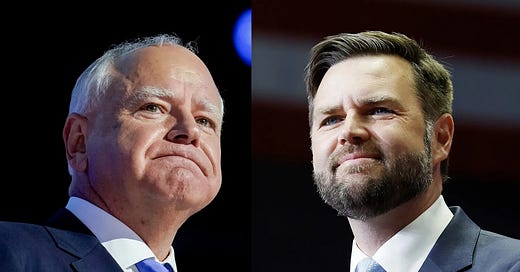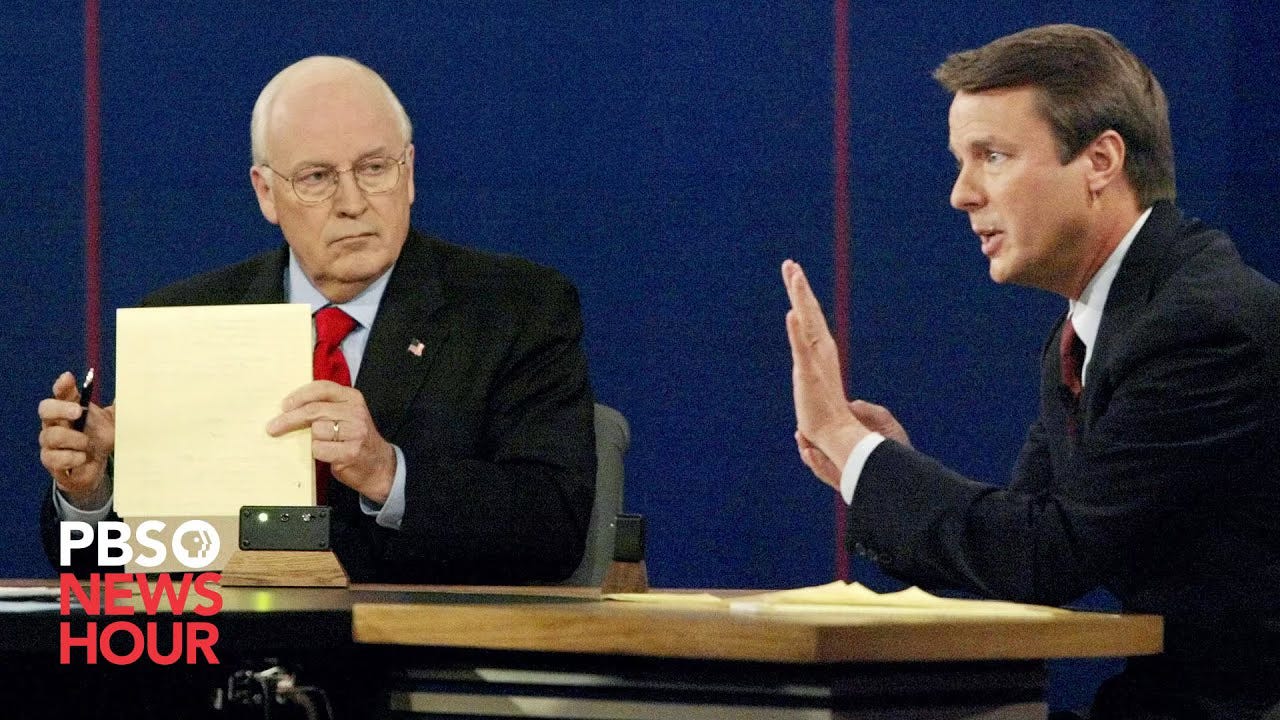Loyal readers will notice that I keep saying debates don’t matter much and then they keep mattering. The Trump-Biden debate was arguably the most consequential presidential debate ever, resulting in a candidate underperforming and dropping out a few weeks later. The Trump-Harris debate didn’t have quite as big an effect, but it was seen as a pretty historic blowout and built up a lot of support for Harris’ fledgling presidential campaign. But what can we expect from this week’s vice presidential debate?
It’s safe to say this won’t affect the polling in the election much, simply because these events tend not to, and generally matter considerably less than presidential match-ups do. Vice presidential debates usually sound like an awesome battle royale in theory, but they rarely amount to all that much in execution. (The Quayle-Bentsen debate may be one exception, and largely because Bentsen got in one really good and well-prepared zinger.) In part, this is because the audience tends to be small and already quite polarized. In part, it’s because the candidates are usually somewhat hamstrung, talking mainly about their running mate and their opponent’s running mate. These events are usually recitations of campaign themes, and vice presidential candidates are often selected for their ability to articulate these themes well without sabotaging their running mates.
JD Vance and Tim Walz were, on some level, selected for the same purpose: to give their coastal running mates more purchase in the Midwest. Has that worked? Harris’ polling position relative to Trump hasn’t really changed since early August in non-midwestern states like Nevada and Arizona, although she may be doing a point or so better than she was in Michigan and maybe Wisconsin. It’s plausible that Walz is out-midwesting Vance, but we’re not talking about large effects here.
But what should stand out about their debate appearance this week is their very distinct personal styles. Obviously they’re both bright and capable public speakers. But what they express is staggeringly different. Walz’s style is one of warmth and compassion. He can speak effectively on policy, to be sure, but his strength is empathy, and demonstrating a jovial kindness and an enthusiasm about others from different backgrounds.
Vance, by contrast, dons the somewhat dispassionate role of the conservative (or New Right) intellectual. It’s notable that he first gained fame for writing a book that sought sympathy for those struggling in Appalachia; his style, at least since 2020, is more that of a hard-nosed ideologue. He pushes for an old-school version of virtue or moral correctness that his party has largely de-emphasized under the leadership of Donald Trump. To the extent he allows emotion in, it’s usually to mock those exemplifying versions of modern life he finds immoral.
Possibly the closest parallel I can come up with is the vice presidential debate of 2004 between a performatively empathetic John Edwards and a proudly bloodless Dick Cheney. Twenty years later, not a lot stands out about that debate, except that Edwards got in a subtle but effective point about same-sex marriage by backhandedly complementing the Cheneys for their love for their lesbian daughter. Cheney landed a few punches portraying Edwards as a lightweight. Surveys suggested Edwards won that debate, but it did not play a particularly large role in the overall campaign. (Edwards’ performance in that debate and overall during what was a losing campaign was strong enough to mount a credible presidential campaign four years later, but he had the bad luck to run against Hillary Clinton and Barack Obama, and the poor judgement to run while sitting on top of a massive personal scandal.)
Although Vance has been a known figure for nearly a decade, few Americans have watched him debate or speak very much, and Walz was barely known outside Minnesota until a few months ago. So to the extent people are watching, they will be learning some new things about these candidates. Given what we know about their styles and the policies and running mates they are advocating, I would expect Walz to come off as the more relatable candidate and possibly the winner, but there are certainly enough unknowns here to make this an interesting watch.
I’m sorry to report that I won’t be live-blogging this debate, but I will be watching and hope to have some analysis available soon after.







Seth, need to brush up on your geography. Nevada and Arizona are Western states. Just by the fact that Stetsons are the hat of choice, and that the landscape is desert plains. Midwest states they are not. You should know that as you are in Colorado a mountain state that separates the Midwestern states from the Western states, ie the Rocky Mountains… gee you need to get out of the office on occasion. 😁😁
This is an empty essay. No point, really.